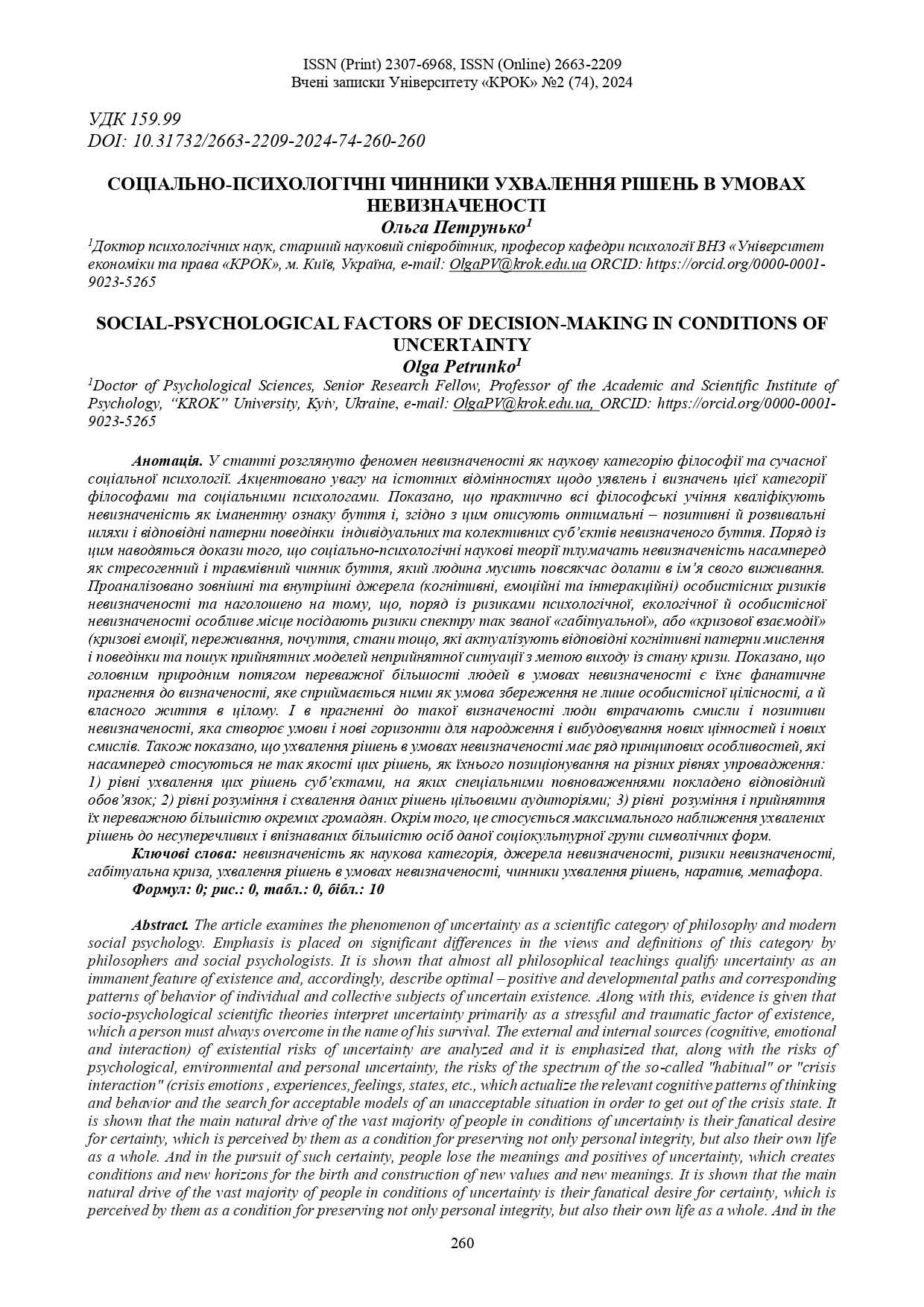SOCIAL-PSYCHOLOGICAL FACTORS OF DECISION-MAKING IN CONDITIONS OF UNCERTAINTY
DOI:
https://doi.org/10.31732/2663-2209-2024-74-273-282Keywords:
uncertainty as a scientific category, sources of uncertainty, risks of uncertainty, habitual crisis, decision-making in conditions of uncertaintyAbstract
The article examines the phenomenon of uncertainty as a scientific category of philosophy and modern social psychology. Emphasis is placed on significant differences in the views and definitions of this category by philosophers and social psychologists. It is shown that almost all philosophical teachings qualify uncertainty as an immanent feature of existence and, accordingly, describe optimal – positive and developmental paths and corresponding patterns of behavior of individual and collective subjects of uncertain existence. Along with this, evidence is given that socio-psychological scientific theories interpret uncertainty primarily as a stressful and traumatic factor of existence, which a person must always overcome in the name of his survival. The external and internal sources (cognitive, emotional and interaction) of existential risks of uncertainty are analyzed and it is emphasized that, along with the risks of psychological, environmental and personal uncertainty, the risks of the spectrum of the so-called "habitual" or "crisis interaction" (crisis emotions , experiences, feelings, states, etc., which actualize the relevant cognitive patterns of thinking and behavior and the search for acceptable models of an unacceptable situation in order to get out of the crisis state. It is shown that the main natural drive of the vast majority of people in conditions of uncertainty is their fanatical desire for certainty, which is perceived by them as a condition for preserving not only personal integrity, but also their own life as a whole. And in the pursuit of such certainty, people lose the meanings and positives of uncertainty, which creates conditions and new horizons for the birth and construction of new values and new meanings.It is shown that the main natural drive of the vast majority of people in conditions of uncertainty is their fanatical desire for certainty, which is perceived by them as a condition for preserving not only personal integrity, but also their own life as a whole. And in the pursuit of such certainty, people lose the meanings and positives of uncertainty, which creates conditions and new horizons for the birth and construction of new values and new meanings. It is also shown that decision-making in conditions of uncertainty has a number of fundamental features that primarily relate not so much to the quality of these decisions as to the positioning of these decisions at different levels of implementation: 1) level of adoption of these decisions by subjects who are assigned the corresponding duty by special powers; 2) level of understanding and approval of these decisions by target audiences; 3) level of understanding and their acceptance by the vast majority of individual citizens. In addition, it refers to the maximum approximation of these solutions to consistent and recognizable by the majority of persons of this socio-cultural group of symbolic forms.
Downloads
References
Артемов, В. Ю., Сингаївська, І. В. Особливості процесів прийняття рішень в умовах невизначеності. Вчені записки Університету «КРОК», 2022. 1 (65). 149–163.
Бурдье, П. (1998). Структура, габітус, практика. Журнал соціології та соціальної антропологї. 1(2). 40–59.
Інформаційний вплив: теорія і практика прогнозування (2011). Національна акад. пед. наук України, Ін-т соц. та політ. психології; ред. Фролов, П. Д. К. : Міленіум. 304 с.
Кримський, С.Б. (2002). Практично-духовне освоєння світу : Філософський енциклопедичний словник. Інститут філософії імені Григорія Сковороди НАН України. К. : Абрис, 742 с.
Лушин, П. В. (2016). Невизначеність, яку не толерують. Теорія і практика психотерапії. 5. Том 3. 2–6.
Петрунько, О.В. & Плющ, О.М. (2021). Перспективи застосування екологічного підходу в сучасних психологічних дослідженнях. Вчені записки Університету «КРОК». 4 (64). 205–216.
Ризики в сучасному нестабільному суспільстві: соціальні і культурні виміри (2021) : за ред. Л.Г. Скокової. Київ: Інститут соціології НАН України. 295 с.
Фріман, А., Бек, А., Девіс, Д. (2024). Когнітивна психотерапія розладів особистості. К.: Науковий світ. 500 с.
Хілько, С. О. (2016). Сутність і типи ситуацій невизначеності у професійній діяльності психологів. Актуальні проблеми психології: Зб. наук. пр. / за ред. С. Д. Максименка, Л. М. Карамушки. Київ: Ін-т психології ім. Г. С. Костюка НАПН України. Т. 1. Вип. 45. 144–150.
Plutchik, R. (2001). The nature of emotions. American Scientist. 8. 344–350.

Downloads
Published
How to Cite
Issue
Section
License

This work is licensed under a Creative Commons Attribution-NonCommercial 4.0 International License.

